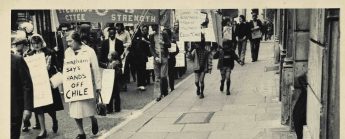Simon Briercliffe is in the first year of his PhD at the University of Birmingham, researching the role of space and place, poverty and immigration in everyday life in a nineteenth-century Wolverhampton neighbourhood. He blogs at http://uptheossroad.wordpress.com and is on Twitter @sbriercliffe.
I often suffer bouts of Imposter Syndrome at academic events. I’m not a historian by background; I don’t have a humanities background even. If you ask what I’m researching I’ll mumble a few vague lines, certain in my knowledge that most people are just being polite in asking. At some point, someone will find out that I’m not a real historian.
Of course, my historian’s senses are now sufficiently developed to see that this truth and knowledge I have is so much daft construction. Most historians are perfectly lovely people, genuinely interested, more keen to learn than to demonstrate their own importance, and certainly not out to do down a fellow learner. One of the most positive outcomes of MBS2015 was the frankness with which people felt able to talk about successes and failures, both within history as a discipline and in their own personal circumstances.
This openness and generosity seems so contrary to many of the expectations placed upon academic researchers at present. Although not an actual Imposter, I am a newbie at this business – I’ve yet to finish my first year, I’ve not done any teaching, and as a self-funded student there’s no obligations on me to undertake public outreach or attend less-than-useful training. The scene-setting PGR/ECR session saw the concerns pile up, and it would be almost impossible to come away optimistic about my employment prospects.
Modern scholarship seems to be only partly about the value of one’s research, and much more a box-ticking exercise in employability. My student email account is filled with invitations to entrepreneurial events and workshops to help incorporate business into my research; about how employers are now looking for more than just teaching experience but input into course creation itself(!); about making my “personal brand” (yuck) competitive.
This is of course one symptom of the ‘neoliberal university’ that was regularly referred to throughout MBS2015. Subsequent governments have done their best to monetarise higher education, turning it towards a business model that it really doesn’t suit. Those concerned for higher education would do well to look at other public services like education, the NHS, bin collection, and consider how well-off we actually are compared to many public sector services. How on earth do you turn around a vast movement like this? With a conference?!
Well, perhaps. To explore just one of many bones of contention among students, engagement with the public is now a criterion that employers seek out, that research councils base funding decisions on, that the shadowy REF awards points for. Students end up placed into (often unpaid) near-internships that may have very little to do with their research. Time that could be profitably spent in research is thus taken up with, essentially, CV-building.
The sad thing is, engaging with the public can be an exciting, vital affair. Community history draws in a wide range of both subjects and researchers. History means something to everyone – for a local example, just follow the comments at the wonderful Brumpic and see how important even the most mundane things are to so many. Also close to home and to name but a few, recent projects on high-rise living in the Black Country, the effects of the closure of Bilston steelworks or of immigration in Sparkbrook, Birmingham, have enabled members of the public with no historical training to learn critical, archival and historical skills – me included.
We as professional (ish) historians have so much both to offer and to learn. It’s sad that such engagement has become another performance indicator, because when we get comfortable with those outside of academia we benefit everyone. We can learn a tremendous amount about what’s important to all sorts of people, giving us greater insight into our own work. We can bring our critical insight and skills to bear on subjects that make a difference to people’s lives. In doing so we bring good history to people who otherwise may not have had access, for a multitude of reasons, to the resources and education – the privilege – that we have had. I did my first small bit of public engagement as a historian recently; the input of those with knowledges beyond the academy proved extremely helpful to my own PhD research.
Perhaps this, then, is a small way to counter the rise of the neoliberal university. I found flavours of it in Steven Brooke’s “affective ecologies,” recalling investment in love, not just financial reward. I found it in the creative histories panel: I blog about my research, for instance, because I love what I do; if others might enjoy it then it should be for free rather than behind a paywall. I found it in Deborah Cohen’s plenary too – for her subjects, familial love interrupted their capitalist endeavours, but love won the day. To appropriate a recurring theme of the conference, perhaps by bringing our love for history to bear at a small scale, we can subvert the neoliberal world into one where peace, love and understanding aren’t such funny things.

